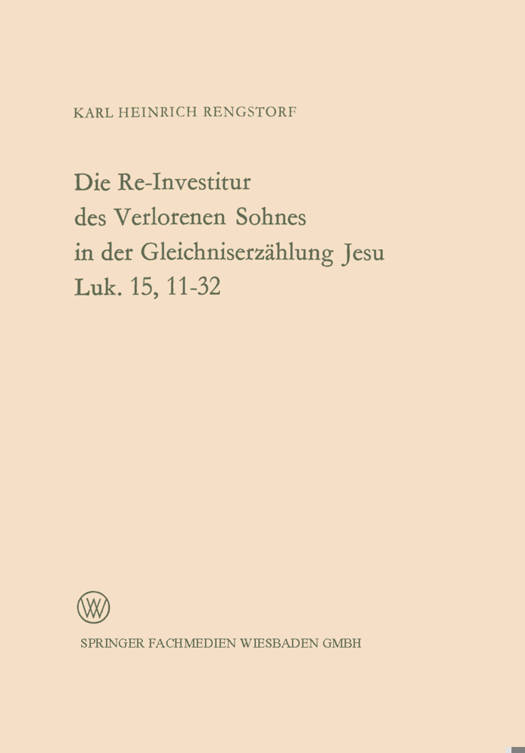
- Afhalen na 1 uur in een winkel met voorraad
- Gratis thuislevering in België vanaf € 30
- Ruim aanbod met 7 miljoen producten
- Afhalen na 1 uur in een winkel met voorraad
- Gratis thuislevering in België vanaf € 30
- Ruim aanbod met 7 miljoen producten
Zoeken
Die Re-Investitur Des Verlorenen Sohnes in Der Gleichniserzählung Jesu Luk. 15, 11-32
Karl Heinrich Rengstorf
€ 54,45
+ 108 punten
Omschrijving
Jesus' well-known parable of the Prodigal Son as told in the Lukan gospel (Luke 15, 11 ff. ) is anything but an allegory. It provides an approach to a 'true-life story' with numerous allusions to life in the oriental surroundings of the writer which, however, were employed by him to serve a religious understanding he considered essential. The disclosing of these allusions to life and their . importance for revealing the concern of Jesus has been the most prominent aim of this lecture. The background of the story is a legal custom which was known and practised in Palestine at the time of Jesus but was abandoned during the first third of the 2nd century, at the latest, or possibly already in connection with the unsuccessful revolt of the Jews against the Romans in the years 60-70 A. D. This is the so-called e atah or e lfah, i. e. 'cutting-off' or 'separation'. This custom consisted of the following: a person - according to Jewish Law always a legally capable man - who had gotten himself into incurable conflict with the interests of his tribe was 'cut-off' in public, with the consequence that the formerly existing personal and material relation-ships were terminated and a radical personal isolation took its place leading to a very noticeable change in the status of the person concerned. Everything we know of this legal custom fits the framework of the story of the Prodigal Son.
Specificaties
Betrokkenen
- Auteur(s):
- Uitgeverij:
Inhoud
- Aantal bladzijden:
- 81
- Taal:
- Duits
- Reeks:
- Reeksnummer:
- nr. 96
Eigenschappen
- Productcode (EAN):
- 9783663003069
- Verschijningsdatum:
- 1/01/1967
- Uitvoering:
- Paperback
- Formaat:
- Trade paperback (VS)
- Afmetingen:
- 170 mm x 244 mm
- Gewicht:
- 167 g

Alleen bij Standaard Boekhandel
+ 108 punten op je klantenkaart van Standaard Boekhandel
Beoordelingen
We publiceren alleen reviews die voldoen aan de voorwaarden voor reviews. Bekijk onze voorwaarden voor reviews.











